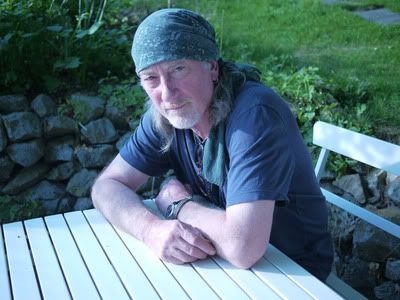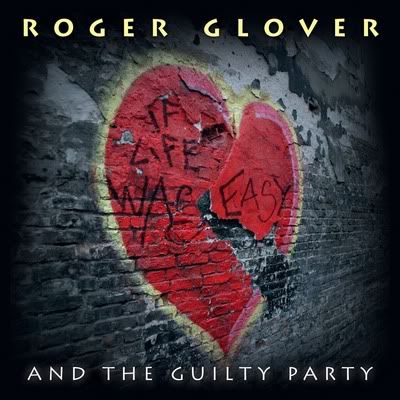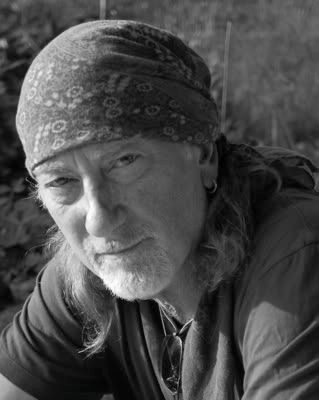DEEP PURPLE's ROGER GLOVER Goes Solo - “A Picture Of An Optimist In Turmoil”
September 13, 2011, 13 years ago
Couldn’t have said it better myself, but then again, Roger has always been much more than a bassist in one of the greatest hard rock bands ever. He’s also a lyricist, songwriter and producer, all of which is evident on his second album with “The Guilty Party,” a record sagely and bravely called If Life Was Easy, a record far away from Purple in rock style, a record in fact of many styles, loosely gathered perhaps as “roots.”
So yes, “It’s a picture of an optimist in turmoil,” begins Glover (not to be repetitive on my part). “Because basically I’m an optimistic person, but I’m going through a lot of crap in my life. So I think, in an effort to mitigate some of those bad feelings, you end up having fun. And so it’s therapy, in a way, and it’s also a sort of confessional, in a way, a way at lashing out at the evil people around you.”

Have you moved from Connecticut?
“I have. I’ve been in Switzerland for the last couple of years. And I’ve got two babies, and the latest one is 13 weeks old. So I mean, it’s a different part of my life. It’s certainly into the next phase of my life, if you like, but I haven’t quite got rid of the entrails of the last phase of my life. I’m still going through a divorce and all the ancillary emotions that go along with that.”Wishing to steer away from the heavy stuff so early in our chat, I wanted to know where this roots rock inclination came from. There’s always been a southern rock and LITTLE FEAT and BOB DYLAN vibe to Roger, on the side of ‘Highway Star’ and the man’s so-called “teenaged eighth notes.” Why?
“I think it probably started off with LONNIE DONEGAN, and the introduction of American music. I mean, I probably heard American music in terms of JOHNNIE RAY and FRANK SINATRA and the big bands and so on, when I was a kid, but skiffle music was different. What went before was so boring to me, and yet skiffle music had such vibrancy and such reality and was so earthy, from the players, the performances, down to the meanings behind the songs. A lot of the songs were blues and gospel because the words have meaning. Whereas, ‘Oh baby I love you’ has no meaning. Well, maybe it does, but it depends on the context. The thing about country and western music is that they actually are so sincere, you believe it (laughs). ‘Oh baby I love you, want you to come back, the kitchen needs washing.’ Or words to that effect. But songs that mean something, I suppose, and of course rock ‘n’ roll blew everyone away, including me. I’m quite proud of the fact that I remember the world before rock ‘n’ roll music, because it was a totally different world. And then when rock music kind of freed performers up to really express themselves, when LITTLE RICHARD screamed, it was real, it was an emotional sound. It wasn’t the controlled Johnnie Ray sigh or Frank Sinatra, you know, breathing, very controlled. And very well, I’m a big Frank Sinatra fan, don’t get me wrong. But Little Richard and CHUCK BERRY… oomph! They did the same thing in music then as JIMI HENDRIX and CREAM did later on. It freed music from the bounds of what had come before. And there are classical versions of the same thing; all the musicians that suddenly found discordance in music. You know, STRAVINSKY was booed off stage, and yet it’s some of the most fabulous pieces of music you’ll ever hear. So a new sense of freedom is what I was looking for. All music is all music to me. Doesn’t matter what style. The simple answer to your question.”With this record, nothing is simple. There are in fact 15 tracks and everyone from old drinking buddies Dan McCafferty and Pete Agnew plus Roger’s gorgeously singing daughter Gillian (ha, was that naming a joke?) show up and sing, along with vulnerable Rog. But make no mistake, the album is very reflective of a life lived, which eventually leads to reflection upon mortality. Or not.
“Well, the best thing is not to think about it, and it will go away. I don’t know. Of course, I thought about that when I turned 30. I thought, ‘Oh, this is it; life’s over. It’s all downhill from here.’ And of course it wasn’t. In fact, it was uphill (laughs). That’s actually quite funny. I don’t know, I think as you get older, obviously, maturity comes into play, and maybe you don’t take yourself so seriously. Or maybe you take yourself more seriously. I don’t know which one it is. I’m probably guilty of both. But honestly, I don’t think about it. I’ve never been one to think about the future, ever. All the big decisions in my life happened to me, rather than just happen by themselves. And so I’ve probably grown up with this philosophy of, ‘Don’t plan.’ As soon as you plan, you’re involved in a fight to make those plans come through, and why fight? I think in general, life is going to roll over us, and we’re going to go with that whether we like it or not. And with the plans you make… you certainly have to book flights if you have to fly somewhere – that’s planning – but you know what I mean? The deeper sense of planning, I don’t do that. I’ve never imagined joining a band that would have lasted this long. I couldn’t have planned it better (laughs). But the fact that I didn’t plan it, it’s probably more valid.”
Is one of the larger lessons of getting older, the fact that there’s a certain futility, or diminished satisfaction, with the art of making a record?
“I think the opposite is true,” muses Rog, always politely contrarian, as is the case, interestingly, with both Purple Ians… intellectual jousters, all. “Certainly the opposite is true as far as live performance. I think I enjoy doing what I do now much more than I ever did before. And I loved it before! But now I cherish it and I appreciate it. Probably because I’ve known in the back of my mind that at some point it will end. And as they say, live each day as if it’s your last. Well, every gig, I play it as if it’s my last. And try to let it wash over me so it sinks in some way into my bones. I just want to appreciate it. Being in the moment is actually the most difficult thing to do. It’s an easy thing to say, but when you’re playing on stage, you’re actually far more in the moment than in any other time of your life. Your senses are so acute, and your brain is working at lightning speed. Even though you’re not concentrating, it’s happening, because you’re listening to the other musicians or you’re looking at the audience or you’re feeling it through the audience, or you’re wondering about what you’re playing: is it in time, is in tune, is it inventive, is it fresh? Even the old songs can be fresh. It’s the attitude. So I love that all the more. So I think writing songs… if I listen to some of my early songs, they’re so naïve and so kind of ugly. I remember trying to write poetry and trying to impress JON LORD once with poetry. You know, he’s an erudite man, cultured and educated, and he very politely said, ‘Oh yes, very nice.’ Damned with faint praise! And I realized of course later that they were in fact awful poems. So you kind of learn to self-edit to the point where you’re not presenting yourself as a real idiot.”So we arrive at If Life Were Easy. And it’s not an absurd concept to enquire of Roger… I mean, here he is making an introspective yet sprawling solo album, intense emotionally, wide-ranging, 65 years of age… is this the definitive statement?
“I will never – although I have – say, ‘Oh, the best record I’ve ever made is this one.’ Because it’s the last record I made. With every record that comes out… and of course a lot of them come with hindsight, five or ten years later, I look back and say, ‘Oh, that was crap.’ I don’t think that about all my output, but there are certain songs and albums I look back and say, oh, it wasn’t as good as I thought it was at the time. So I always take myself with a pinch of salt, and try not to be too involved. I can’t help self-criticize, but not to the point of being destructive. Once, I remember, actually Jon Lord, coming in again, when we finished Deep Purple In Rock, and both IAN GILLAN and I had been through this kind of magical door from being unknown, in a band and admitted to a band that was about to make it, and writing really, really good stuff, much different from what we’d written before, for four or five years. And we finished DEEP PURPLE In Rock, and we were in a train going up to Scotland, and we were talking about the album and I said, ‘Yeah, yeah, but it could’ve been so much better.’ And Jon turned around and almost snapped my head off. He said, ‘No it couldn’t! Because if it could’ve been, it would’ve been! It is what it is. Let it go! It’s finished.’ And I guess I’m guilty of that. I’m always wanting to tinker and make things better and make things better, and half the time, in the process, you make things worse. So I guess I’ve got a new respect for spontaneity. I believe that spontaneity and instinct play a vital part in songwriting, and performance.”“I know there’s a story going on that I finished it in 2007,” continues Roger, with us now onto a second phone call, addressing the subject of tinkering, I suppose. “Or 1847, I’m not sure. But that’s not true. I’ve been working on it off and on the last nine or ten years, and in fact, the only time I realized that I had to finish the album is when my daughter said to me, ‘You’ve got to stop writing songs and get the album out.’ Because it was going on for so long. It’s in-between gigs and in-between families and in-between a life, if you like. So it’s written in spurts here and there, usually late at night in my studio, wherever I happen to be. The studio’s just a computer, really. And so it wasn’t until she said that, that I realized I really had to stop and put something together. Because actually I wrote twice as many songs that are on the album, and a lot of the early ones tend to be a bit self-sympathizing, a bit too close to the bone, if you like, a bit too honest. I don’t know, you can’t be too honest, I know, but they are a bit morbid. My mom said to me, years back, before she died, ‘They’re nice, but they’re very sad, aren’t they?’ And I think I’ve mentioned this to you before, but her saying that, and Gilly saying, ‘Stop writing and finish the album,’ those are the two things. The 2007 thing, I don’t know where that came from.”

Nice to work professionally with your daughter I imagine… “You know, Gillian’s mother and I divorced when she was a young girl, so we never actually lived together,” says Roger. “We’re close, I mean, great relationship, but we never really lived together that long. And so you know, anytime I get to be with her or work with her, it doesn’t happen that often. In fact, I’m seeing her tomorrow for the first time in almost ten months. But yes, with Snapshot, when she did that one song, she had joined a band, she turned from this little teenage flat voice wannabe into her own person, by the time she got to her mid-20s. And now she is definitely her own person, and she writes great, and she’s on the album not because she’s my daughter, but because she’s actually worth it. And that’s the relationship between us. We can be honest with each other. I can say what I feel and she can say what she feels. And you don’t get hurt.”
And finally, there’s a bit of continuity here, but also messiness (like life)… the question is: why is this band called The Guilty Party?
“I did Snapshot just after I broke up with my wife,” explains Glover, always, it seems, with an element of laying it on the line, ‘cos there’s just not that much time. “And I guess foreshadowing what was about to come, divorce and everything like that, in court there’s always the guilty party (laughs). It’s a legal term of course, but I liked the juxtaposition of Guilty and Party. I thought that was kind of nice. And I just felt, I don’t know, I’m not really a solo performer. I’m much happier in a band. So I thought, I’m going to form a band, and so there’s no guilty party, really, except for whoever I work with. But I want them to feel part of the band as well. A lot of musicians tend to make their living doing sessions, and usually with a click track and learning a part and not knowing really what the finished thing is going to be like. And when they come into the studio to work with me, I want them to be themselves. So in a way it is a band; it’s an impromptu band, but a band nonetheless. Everyone gets a chance to express themselves the way they feel.”










